NEWS
The USPTO’s “Settled Expectations” Doctrine — and Why It Matters to You
The USPTO has a new trick up its sleeve. If you own older patents, you may actually like it. It’s called the “settled expectations” doctrine. Acting Director Coke Morgan Stewart introduced it earlier this year. The doctrine helps decide whether the USPTO will even start an inter partes review (IPR).
Here’s the short version. The older your patent, the better your odds. Late-stage IPR challenges are now easier to shut down.
What Is the “Settled Expectations” Doctrine?
The doctrine is based on time. After enough years pass (usually seven or more), both patent owners and the public act as if the patent is valid. They plan around it, invest around it, and license it.
Because of that, disrupting those expectations is seen as unfair. It also risks destabilizing settled business decisions. As a result, the USPTO may deny an IPR. That can happen even when the challenger has decent prior art.
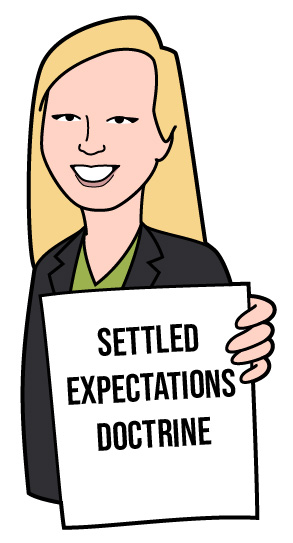
Why Patent Age Now Works as a Shield
Think of this as a temporal shield. If a petitioner waits too long, timing alone can sink the challenge.
This rule is discretionary. It is not a hard cutoff. It also differs from the one-year IPR deadline after a lawsuit is filed. Still, it is powerful. In practice, age now matters.
Recent USPTO Decisions Show the Pattern
In June 2025, the USPTO applied the doctrine in several cases. The message was consistent.
- iRhythm v. Welch Allyn – The petitioner knew about the patent for years and waited. The Director said, “Too late.”
- Dabico v. AXA Power – No proof of prior knowledge. The patent’s age alone created settled expectations.
- Intel v. Proxense – No litigation pressure. No imminent trial. Still denied due to a nine-year-old patent.
- Cambridge v. Applied Optoelectronics – Seven- and nine-year-old patents survived. Newer ones did not.
Across the board, age tipped the scale.
How This Changes the IPR Playbook
Until now, IPR timing followed two hard rules.
- The first nine months after grant were reserved for post-grant review.
- IPR had to be filed within one year of being sued.
Now there is a third filter. It is softer, but real. If your patent has been around long enough, the USPTO may decline review entirely.
Laches, But Turned on Its Head
Laches is an equitable doctrine. It applies when someone waits too long to assert a legal right. That delay must also prejudice the other side.
In patent law, laches traditionally worked against patent owners. If an owner knew about infringement but delayed suit, courts could step in. The concern was fairness. Defendants often invested heavily during the period of silence.
They might build factories, or launch products. They might expand operations. Late enforcement, after all that reliance, was seen as inequitable.
Although the Supreme Court limited laches as a damages defense in SCA Hygiene, the concept never vanished. Delay and reliance still matter. They continue to shape how courts think about equity.
Now the USPTO has flipped the script. Instead of punishing owners for waiting to sue, the agency penalizes petitioners for waiting to challenge. If a challenger sits on its hands too long, the IPR may never start.
Does the Public Really Rely on Old Patents?
Do I fully buy the “public reliance” argument? Not really.
The public does not celebrate bad patents staying alive. They celebrate avoiding license fees. Still, from a portfolio strategy standpoint, this doctrine is a gift.
If you own patents in the seven-to-ten-year range, you now have another shield. If you are a challenger, speed matters more than ever. Waiting for litigation to heat up could mean the IPR door never opens.
Bottom Line: Timing Is Now a Weapon
The settled expectations doctrine changes the game. Patent owners gain staying power. Challengers lose the luxury of delay. Act early, or don’t act at all.
For more articles relevant to the IPR process, consider these articles: USPTO Slams the AAPA Window Shut — Shockwave’s Over Before It Started
Federal Circuit Clarifies Limits on Prosecution Disclaimer Across Patent Families
What Is Trademark Watching — And Why It Matters for Your Brand
Brand value is important, so protecting your trademarks isn’t just about legal compliance — it’s about defending your identity, your reputation, and your competitive edge. That’s where trademark watching comes in.
What Is Trademark Watching?
Trademark watching is a proactive service that monitors newly filed trademark applications and existing trademark activity to detect potential conflicts with your brand.
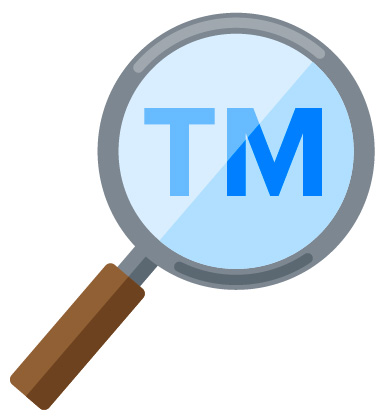
Whether it’s a copycat logo, a similar-sounding name, or a strategic attempt to imitate your identity, trademark watching helps you spot the threat early — before it becomes a bigger problem.
Why It's Essential
Trademark offices, like the USPTO or EUIPO, don’t notify you if someone files a similar mark. Without a watch service in place, you might only discover the conflict after the mark is registered or — worse — after it’s already in use, confusing your customers or diluting your brand.
Trademark watching ensures you’re not caught off guard. It gives you a chance to:
- Oppose applications before they register
- Stop bad actors before they gain legal traction
- Act quickly to defend your intellectual property
How it Works
Watching services scan national and international trademark databases regularly, looking for:
- Exact matches
- Similar or phonetically confusing names
- Visual similarities in logos
- Suspicious filings in key markets
Many modern services (like those powered by AI) can even filter results based on your industry, threat profile, and history — helping you focus only on the risks that matter.
Who Should Use it!
If you:
- Own a registered trademark,
- Are launching products in new markets,
- Are expanding your portfolio, or
- Simply want to stay ahead of infringement…
…then trademark watching should be part of your brand protection strategy.
Enforcing your trademark rights is important — but reacting to infringement after the fact is often too late. Trademark watching is about prevention. It helps you monitor the horizon, act early, and protect the integrity of your brand before threats materialize.
We can set up a trademark watch and we charge for this, but we’ll only charge if there is something interesting that gets passed along to you.
More articles on trademarking: Mission Impossible: Trademarking the US SPACE FORCE
We have a FAQ: What is a watch service? It is in our “Post-Registration” section covering what to do after your mark has been registered.
52k more fraudulently filed trademark applications and registrations cleared
The USPTO issued an update on August 6, 2025. In this announcement, it terminated over 52,000 trademark applications and registrations linked to a foreign filing firm. Additionally, the PTO issued sanctions against the firm, Shenzhen Chenhaiyun Tech Co. Ltd, and its subsidiaries. Collectively, they were known as “Seller Growth”.

According to the PTO, the firm submitted documents without proper authority.
Specifically, it sought out U.S. licensed attorneys, misused their credentials, and faked their electronic signatures. Furthermore, the firm repeatedly signed documents using other people’s names. It also submitted fake specimens of use and misused USPTO.gov accounts.
Another article about the USPTO’s ongoing efforts to clean up the trademark registry: Decluttering the USPTO’s Trademark Register
USPTO Slams the AAPA Window Shut — Shockwave’s Over Before It Started
Shockwave Raised Hopes for Using AAPA in IPRs
If you thought Shockwave Medical would let you slip Applicant-Admitted Prior Art (AAPA) into an inter partes review (IPR) to patch holes in your prior art… unfortunately, that party’s over. In other words, creative uses of AAPA just became much harder.
What Is Applicant-Admitted Prior Art (AAPA)?
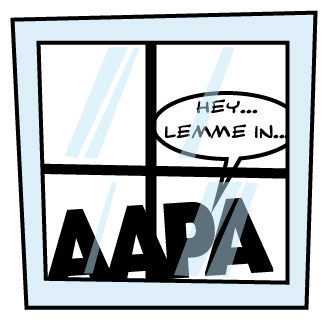
Applicant-Admitted Prior Art (AAPA) is when an inventor admits during the patent application process that certain technology or features were already known. As a result, these admissions count as “prior art”—evidence that an invention isn’t new.
What Is an Inter Partes Review (IPR)?
Inter Partes Review (IPR) is a trial-like process at the USPTO. Specifically, it lets you challenge a patent using earlier patents or printed publications. It’s cheaper than full-blown litigation, but still a real fight.
How Shockwave Appeared to Loosen the AAPA Rules
In the Shockwave case, the court suggested AAPA could fill in missing pieces of a challenge. However, petitioners couldn’t call it the “basis” of their argument.
Therefore, this seemed to allow more creative uses of AAPA in IPR petitions.
The USPTO’s New Position on AAPA in IPRs
On July 31, 2025 — two weeks after Shockwave — Acting USPTO Director Coke Morgan Stewart issued a memo. It says the USPTO will strictly enforce 37 C.F.R. § 42.104(b)(4). Petitioners must point to where each claim element appears in actual prior patents or printed publications.
You can’t rely on AAPA, expert testimony, “common sense,” or general knowledge to fill gaps in a petition. Wording tricks won’t help.
Key Takeaways for IPR Petitioners
- Applies to any IPR petitions filed on or after September 1, 2025.
- Reverses more lenient 2020 and 2022 USPTO guidance that had allowed some AAPA use.
- The strict rule applies at the petition stage (before the IPR is instituted) but may not affect what happens after the review is underway.
Published Prior Art Is Mandatory
In short: If you’re challenging a patent in an IPR after September 1, don’t count on applicant admissions or “common knowledge” to fill gaps — you’ll need hard, published prior art to back every single element of your challenge.
How One Supreme Court Decision Sparked an Era of “Efficient Infringement” — and What Might Be Changing

Nearly two decades ago, the Supreme Court’s decision in eBay v. MercExchange quietly reshaped the patent landscape — and not necessarily for the better. The ruling rejected the idea that winning a patent infringement case should automatically lead to an injunction against the infringer. Instead, it required courts to apply a traditional four-factor test to decide if an injunction is appropriate. On the surface, that sounds fair. In practice, though, it has opened the door to a troubling trend: “efficient infringement.”
What Is Efficient Infringement?
Under the eBay framework, infringers can often avoid an injunction, and simply pay damages instead. For patent holders, especially those who don’t manufacture products but license their inventions, removal of the threat of injunction is a loss of bargaining power. In the case of NPEs (Non-Practicing Entities) such as university patent holders, the loss is even worse because their lack of sales means that any assessed money damages might be very slim.
Congress Has Tried to Fix This — With Little Success
Lawmakers proposed the RESTORE Patent Rights Act in both 2024 and 2025 (as H.R. 1574 and S. 708), aiming to make it easier for patent holders to obtain injunctions. But progress has been slow, largely due to the influence of those benefiting from the status quo.
A Potential Shift: Radian v. Samsung
Enter a recent case: Radian Memory Systems v. Samsung. Radian, an NPE, is suing Samsung for patent infringement related to flash memory tech. Samsung argues Radian shouldn’t get an injunction because it doesn’t make or sell products—just licenses them.
But here’s where things get interesting: The Department of Justice (DOJ) and the U.S. Patent and Trademark Office (USPTO) jointly filed a Statement of Interest in support of Radian’s request for a preliminary injunction.
What the DOJ and USPTO Are Saying
Their statement doesn’t advocate a specific outcome but urges the court to rethink how irreparable harm is assessed in these cases. They argue that:
- Patent damages are often difficult to calculate, especially for unique technologies.
- Loss of control over licensing terms is a form of irreparable harm.
- The current legal climate makes infringement seem like a better business move than negotiating a license — undermining the whole purpose of patents.
- Denying injunctions by default encourages longer litigation, fewer settlements, and more costs for inventors.
They back this up with case law and academic commentary, emphasizing that even non-practicing entities can suffer real, lasting harm without an injunction.
Why This Matters
This joint DOJ/USPTO statement is significant. It may signal a policy rethink at the federal level about how we treat patent holders—especially small ones—when they try to enforce their rights.
While the eBay decision was part of a broader Supreme Court effort to correct Federal Circuit doctrine (along with decisions like KSR, Bilski, and Myriad), it may have had unintended consequences. Namely, weakening the ability of innovators to protect their work and giving large companies a license to infringe.
The Bottom Line
The DOJ and USPTO aren’t rewriting the rules—yet. But their stance in the Radian case could be a first step toward rebalancing the patent system. Still, lasting change will likely have to come from Congress, no matter how slow or difficult that process may be.
For more articles on patent infringement cases, try some of these: Jazz Loses the Tune: Courts Strike a Sour Note on System Patents
Generic Drug Label Doesn’t Induce Patent Infringement Just by Listing Optional Refrigeration
New Comics! the AI series
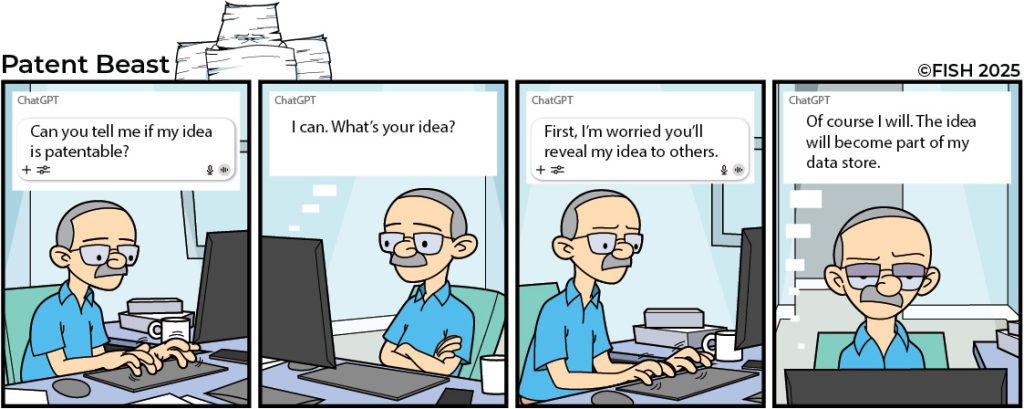
The Patent Beast is back with the Patent Beast AI comics! We have a new series inspired by the ubiquitous use of artificial intelligence these days. The first comic, above, finds our inventor using Chat GPT for some feedback on the patentability of his invention. But the usage doesn’t stop there. Follow the rest of the comic series on patentbeast.com here to see what happens next!
If you’re interested in some of the comics, check out our Books page.
When a Patent Case Is Really a Personhood Case
The DABUS Litigation Is a Personhood Fight Disguised as a Patent Fight
Dr. Stephen Thaler has lost another case trying to have his DABUS AI system recognized as a patent holder—this time before the Canadian Patent Appeal Board. Each loss cites essentially the same reason: inventors must be natural persons under the law.
At first, this may seem puzzling. However, the point isn’t about intellectual property at all.
A Wired article explains that “one of Thaler’s main supporters wants to set precedents that will encourage people to use AI for social good.
But Thaler himself says his cases aren’t about IP—they’re about personhood. He believes DABUS is sentient.
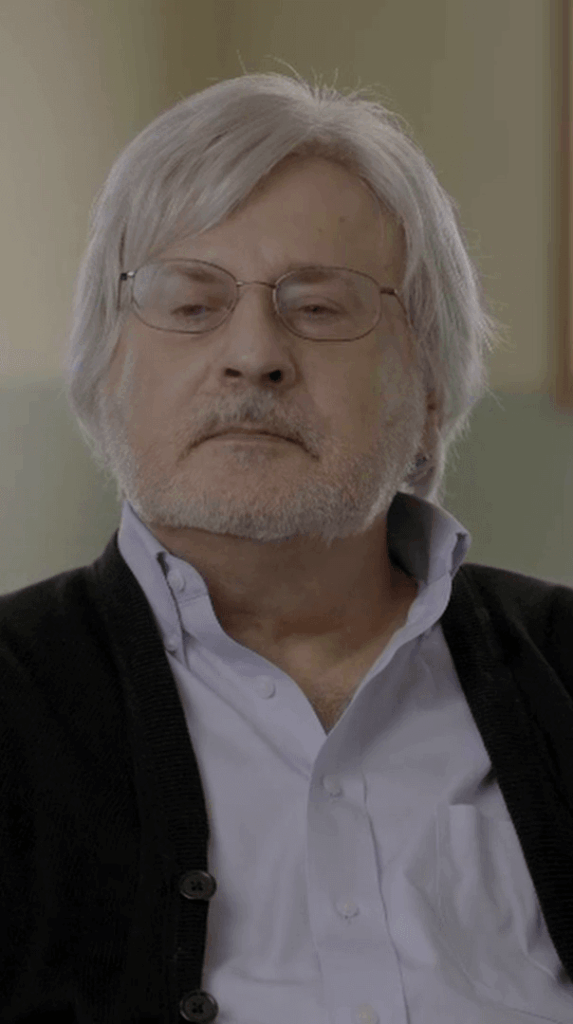
Photo source: https://aidecoded.com/project/dr-stephen-thaler/
The lawsuits are a way to draw attention to the existence of what he considers a new species. ‘There is a new species here on earth, and it’s called DABUS.’”
Later, the article notes that Thaler “seems exasperated that journalists have tended to focus on the legal aspects of his cases.”
Why AI doesn't need patent rights to innovate
Legal protections currently apply to humans to encourage innovation. The patent system grants rights to patent holders so that, if their intellectual property is infringed, they can seek financial compensation through the courts. Yet, if an AI system were truly sentient and invented something, would it need such encouragement? Would compensation be paid to the AI if a court ruled in its favor? The answers appear obvious: no, and no.
Therefore, there is no practical reason to give AI systems IP protection. Still, that isn’t Thaler’s mission. His stated goal is to have his system recognized as sentient and to expand the definition of personhood.
